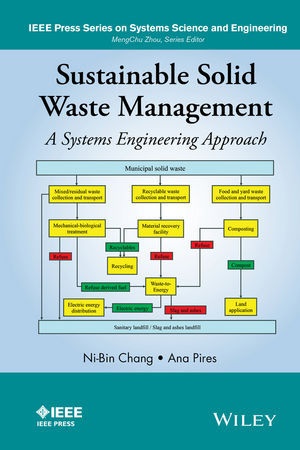Read more
"Systems engineering techniques such as optimization tools, simulation model, integrated modeling systems, management information systems, decision support tools, material flow analysis, and life cycle assessment have been developed, yet have not been applied to the waste management industry as practical tools. This book introduces how to apply systems engineering techniques not only by theory, but also through practical case studies. The target applications include urban, industrial, hazardous and non-hazardous waste, waste streams such as waste packaging, end-of-life vehicles, waste batteries, waste of electric and electronic equipment, waste lubricant oils, end of life tires and all waste streams demanding sustainable management via appropriate systems analysis to meet both managerial and technical goals"--
List of contents
PREFACE xix
I FUNDAMENTAL BACKGROUND 1
1 INTRODUCTION 3
1.1 The Concept of Sustainable Development 3
1.2 Sustainability in the Context of SWM 10
1.3 The Framework for Sustainability Assessment 12
1.4 The Structure of this Book 13
References 16
2 TECHNOLOGY MATRIX FOR SOLID WASTE MANAGEMENT 19
2.1 Waste Classification and Types of Waste 19
2.2 Waste Management Through Waste Hierarchy: Reduce, Reuse, Recycle, Recover, and Disposal 28
2.3 Waste Operational Units: Real-World Cases 34
2.4 Waste Operational Units: Equipment and Facilities 42
2.5 Technology Matrix for Multiple Solid Waste Streams 72
2.6 Final Remarks 90
References 90
3 SOCIAL AND ECONOMIC CONCERNS 99
3.1 Financial Concerns 100
3.2 Economic Incentives and Socioeconomic Concerns 114
3.3 Social Concerns 123
3.4 Final Remarks 133
References 134
4 LEGAL AND INSTITUTIONAL CONCERNS 141
4.1 SWM Legislation 141
4.2 Sustainable Waste Management Principles and Policies 151
4.3 Policy Instruments 155
4.4 ISWM Plans 162
4.5 Final Remarks 163
References 163
5 RISK ASSESSMENT AND MANAGEMENT OF RISK 171
5.1 Formulate the Problem: Inherent Hazards in Solid Waste Management 171
5.2 Risk Assessment in Solid Waste Management 176
5.3 Management of Risk 183
5.4 Risk Communication 184
5.5 How to Promote a Sustainable Solid Waste Management with Risk Analysis? 186
5.6 Final Remarks 188
References 188
II PRINCIPLES OF SYSTEMS ENGINEERING 193
6 GLOBAL CHANGE, SUSTAINABILITY, AND ADAPTIVE MANAGEMENT STRATEGIES FOR SOLID WASTE MANAGEMENT 195
6.1 Global Change Impacts 195
6.2 Sustainability Considerations and Criteria 208
6.3 Adaptive Management Strategies for Solid Waste Management Systems 208
6.4 Final Remarks 210
References 210
7 SYSTEMS ENGINEERING PRINCIPLES FOR SOLID WASTE MANAGEMENT 215
7.1 Systems Engineering Principles 215
7.2 System of Systems Engineering Approaches 222
7.3 Centralized Versus Decentralized Approaches 227
7.4 Sensitivity Analysis and Uncertainty Quantification 230
7.5 Final Remarks 232
References 233
8 SYSTEMS ENGINEERING TOOLS AND METHODS FOR SOLID WASTE MANAGEMENT 235
8.1 Systems Analysis, Waste Management, and Technology Hub 236
8.2 Cost-Benefit-Risk Trade-Offs and Single-Objective Optimization 240
8.3 Multicriteria Decision-Making 248
8.4 Game Theory and Conflict Resolution 283
8.5 System Dynamics Modeling 287
8.6 Final Remarks 290
References 292
Appendix Web Site Resources of Software Packages of LINDO and LINGO 299
III INDUSTRIAL ECOLOGY AND INTEGRATED SOLID WASTE MANAGEMENT STRATEGIES 301
9 INDUSTRIAL ECOLOGY AND MUNICIPAL UTILITY PARKS 303
9.1 Industrial Symbiosis and Industrial Ecology 303
9.2 Creation of Eco-Industrial Parks and Eco-Industrial Clusters 309
9.3 Municipal Utility Parks in Urban Regions 314
9.4 Final Remarks 319
References 321
10 LIFE CYCLE ASSESSMENT AND SOLID WASTE MANAGEMENT 323
10.1 Life Cycle Assessment for Solid Waste Management 323
10.2 Phases of Life Cycle Assessment 325
10.3 LCA Waste Management Software 355
10.4 Putting LCA into Practice 361
10.5 Life Cycle Management 374
10.6 Final Remarks 376
About the author
Ni-Bin Chang, PhD, is an elected fellow of the American Society of Civil Engineers and the American Association for the Advancement of Society, as well as a senior member of the IEEE. He has co-authored and authored seven books including
Systems Analysis for Sustainable Engineering: Theory and Applications and over 190 peer-reviewed articles.
Ana Pires, PhD, is a member of IMAR-CMA - Marine and Environmental Research Centre, Portugal, and is a research engineer in the Department of Environmenyal Sciences (Departamento de Ciências e Engenharia do Ambiente).

